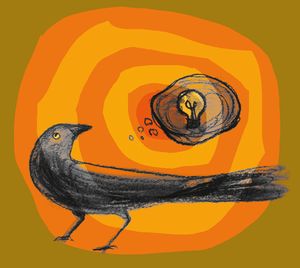Some people have a God complex, imagining they are saviours of humankind. Most cruise along with a human complex. We believe our consciousness, imagination, free will and self-awareness make us special, setting us apart from other creatures. But new research contradicts notions of human exceptionalism. Animals, too, have these qualities. Humans are now left with an inferiority complex and an identity crisis.
Take crows. That ugly, ubiquitous bird is useful as a scavenger but is neither modest nor musical. But German Tübingen University researchers prove that crows have “impressive reasoning skills”. The sophisticated ability called “statistical inference” is thus no longer an exclusive human trait. Crows, too, make informed decisions evaluating current conditions with past experience. Perhaps, Hinduism honours crows as ancestors for good reason.
Crows grasp how one choice may be optimal in one context, but not in another—the way humans determine a traffic route to the mall is good on Monday afternoon but congested on Saturday evening. They can also compare probabilities, choosing options not randomly, but after analysing success rate. They are social, family oriented—bond for life and hoard food for future.
Humans believe that free will shapes their future. But that, too, is now under dispute. After 40 years of research, Stanford neurobiologist Robert Sapolsky concludes, “There is no free will because all human behaviour is as far beyond our conscious control as epileptic convulsions, cell divisions and heartbeat.”
What about imagination? Answers American neuroscientist, Albert Lee, “To ima gine is one of the remarkable things that humans can do. Now we have found that anim als can do it too.” His team’s research shows that rats have imagination. They can imagine places they are not in and objects they can not see. Studies on animal self-awareness by Hamburg’s Universities of Bonn and Bochum suggest that roosters recognise themselves in the mirror. So the rooster may not be greeting the rising sun after all, but preening and crowing to the world that he has risen. Biopsychologist Onur Güntürkün says, “Our work suggests that traditional tests may undervalue the cognitive abilities of animals like roosters.”
And humans maybe overestimating their abilities. The octopus has a brain in each of its tentacles, eagles can see prey two miles away, chameleons have 360-degree vision, scorpions can hold their breath for six days, Tom Cruise for six minutes and his fans for two hours. Evolutionary biology improves the skills essential for survival. The opposite is also true, underscoring the principle—“use it or lose it”. The Mexican tetra fish didn’t require to see because they got trapped in pitch-dark caves. Eventually they became blind.
With technology, artificial intelligence and social media, our emotions are on steroids. But are our cognitive abilities declining? When we use less and less of our brain to calculate, cultivate, navigate, discern, memorise, recall and concentrate, will we lose it? Some important human faculties have already shrunk. The average human attention span is eight seconds. That is less than a goldfish, which has nine seconds.
Clever crows prove that the insulting phrase “bird-brained” should be banished. Bird skills are exceptional. Some can “duet”—produce two separate sounds at once! And crows have sharp memory. They can recall rules of a newly taught game even a month later. They recognise faces and bear grudges. They harassed the scientists who had captured them for research. They remember who fed and who shooed them. When a crow turns its eye to look at you, it is not merely watching, it is calculating. This is creepy. But also humbling.
Pratap is an author and journalist.


